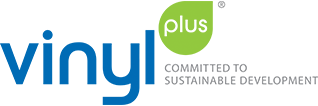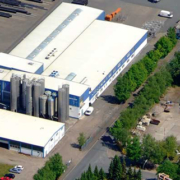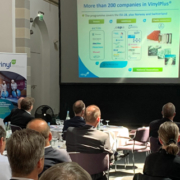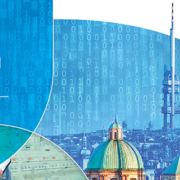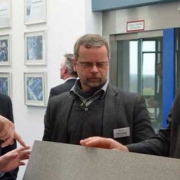VinylPlus®, the Voluntary Commitment to sustainable development of the European PVC industry, recycled 739,525 tonnes of PVC within its framework in 2018 – a 15.6% increase on the previous year. The results were presented at the 2019 edition of the VinylPlus Sustainability Forum in Prague, Czech Republic, where the industry shared further progress towards increasing the sustainability performance of PVC.
Held on May 9th and 10th, this year’s theme ‘Accelerating Innovation’ examined the challenges and opportunities presented by new technologies in shaping the PVC sector’s future in the context of the circular economy.
The Forum attracted more than 170 participants from 32 countries including representatives from the European Commission, European Parliament, the Czech Ministry of Environment, the United Nations, NGOs, academia, specifiers, designers, recyclers and the PVC value chain. Presentations and panel discussions by top-level experts revolved around the three sustainability pillars – economic, social and environmental – and how innovation is impacting the PVC industry and its journey to sustainable development.
Despite regulatory constraints, VinylPlus General Manager Brigitte Dero announced that the PVC industry recycled an all-time high of nearly 740,000 tonnes – 92.4% of the VinylPlus’ 2020 target. Recovinyl remains the main contributor, registering 734,568 tonnes of recycled PVC. Cumulatively, almost 5 million tonnes of PVC have been recycled since 2000.
“VinylPlus continues to be a frontrunner for the circular economy,” commented Brigitte Dero. “Through our Voluntary Commitment, we are making continuous progress towards our sustainability goals amid the development of EU policies impacting the plastics sector.”
The Forum was opened by the Czech Minister of Environment, Richard Brabec, who emphasised the need for the sustainable management of plastics in the context of the circular economy. He called for an uptake of both recycling and the demand for recycled products.
Welcoming delegates, VinylPlus Chairman Stefan Sommer said: “The reason behind VinylPlus’ success is the commitment of the entire value chain, involving the cooperation of resin manufacturers, additive producers and PVC converters. To achieve further success, we will need to intensify cooperation with our partners and may need to identify new ones.”
He emphasised that a “balanced and harmonised legislative framework for the recycling of plastics is essential to secure our contribution to the circular economy and to achieve our new recycling target of at least 900,000 tonnes by 2025.” This would be in line with the European Commission’s objective of 10 million tonnes for the plastics industry, underlining VinylPlus’ continuous engagement with regulators and institutions.
Member of European Parliament Martina Dlabajová explored the industry’s role in the evolution of society and education needs. She said: “It’s so timely to speak about accelerating innovation because we need to consider the challenges and opportunities of the future. Climate change, sustainability and the environment are important topics dominating the political agenda.”
She added “Evolution towards sustainable development requires a change of mindset. I often find myself using VinylPlus as an example of a voluntary commitment to sustainable development from industry that works. Only through cooperation with businesses and industry can politicians make informed decisions.”
Following her, Fulvia Raffaelli, Head of Unit at DG GROW, European Commission, highlighted how the construction sector is adapting to digital times. “Construction is often perceived as a conservative sector, but it’s not. It’s very innovative and digitalisation can really help to drive innovation in the direction of sustainability. That’s where we need to focus; to drive digitalisation in this sector to achieve sustainability objectives across the lifecycle approach, from the design phase to the use and recycling at the end of life.”
Outlining the Sustainable Development Impact Indicators for Social and For-Profit Business, Ilcheong Yi, Senior Research Coordinator from the United Nations Research Institute for Social Development (UNRISD) said: “The underpinning value of the combined social, economic and environmental pillars is vital; sustainable development is about more than durability. VinylPlus is a good case of a holistic approach to these underpinning values.”
Jenny Walther-Thoss, Policy Officer of Sustainable Biomass and Sustainable Certification at World Wide Fund (WWF), delivered a presentation on Environmental Standards and Certifications through an NGO lens. She stressed that products need to fit a more holistic approach to the circular economy through more efficient production methods and a focus on the longevity of the product. When discussing certification systems, she placed the emphasis on the need to deliver impact and value, however recognised that finding that balance is a difficult issue to solve.
In an award ceremony, a further four profile manufacturers – Deceuninck, Finstral, Salamander Industrie Produkte and Internorm – were awarded the VinylPlus® Product Label. To date, eight profile manufacturers have been awarded the Product Label for 43 profile systems manufactured in 13 European sites across 11 countries. Based on sustainability criteria, including responsible sourcing and additives, the VinylPlus® Product Label is open to all PVC building and construction products.
Dr. Jo Dewulf, Professor of bioscience engineering at Ghent University (Belgium) and new Chairman of the VinylPlus Monitoring Committee, delivered a keynote on Sustainability as a Key Driver for Innovations in the Plastics Industry and reflected on the impact of innovation for the future of the PVC industry.
Closing the forum, Arab Hoballah, Team Leader at EU-SWITCH-Asia Sustainable Consumption and Production Facility (SCP) and Ex-Chief SCP for the United Nations Environment Programme (UNEP) emphasised how ‘eco-innovation’ could help to address the sustainability challenges faced by the PVC industry. He said: “This requires mainstreaming sustainability with a lifecycle approach throughout all business operations and creating novel solutions to meet market demand. We cannot live without plastic, so let us talk about the ‘good’ ones properly.”
Reflecting on the Forum, Brigitte Dero concluded: “For almost 20 years, VinylPlus has led the way towards a circular economy by improving the sustainability performance of PVC. By forging ever-greater collaborations and partnerships in pursuit of our sustainability goals, we will take our industry voluntary commitment to ever greater heights.”
VinylPlus is the Voluntary Commitment of the European PVC industry. The programme establishes a long-term framework for the sustainable development of the PVC industry by tackling a number of critical challenges in the EU-28, Norway and Switzerland.
For more information on VinylPlus’ achievements in 2018, check our Progress Report 2019
